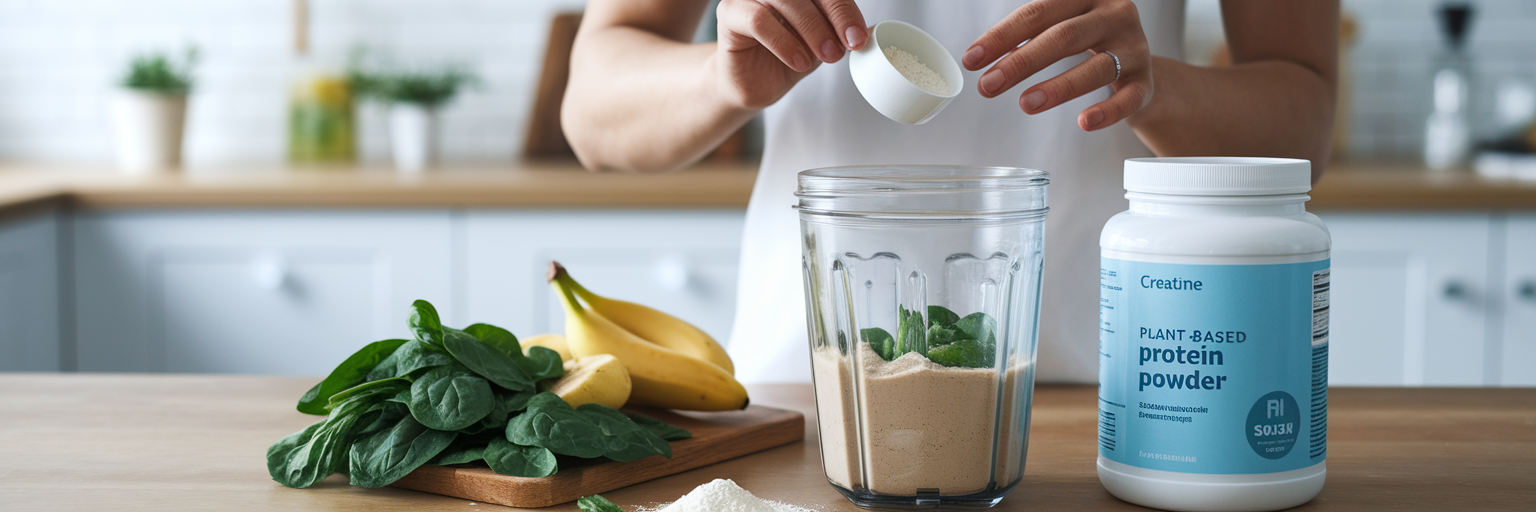If you're a plant-based athlete, you’ve probably heard whispers about creatine. Maybe you've wondered if it fits into your lifestyle or if it's even necessary. The good news is that not only can you find high-quality vegan creatine, but it might just be one of the most effective supplements for enhancing your performance. Let's walk through how to choose the right one and why it makes such a difference.
What to Look for in a Vegan Creatine Supplement
The first question most people ask is, "Isn't creatine from meat?" While creatine is naturally found in animal tissue, that's not where supplements come from. Virtually all creatine on the market is produced synthetically, making it inherently vegan-friendly. The real task is sorting through the options to find a truly clean and effective product.
Focus on Purity and Synthetic Sourcing
The key to a great vegan creatine monohydrate is a clean manufacturing process. You want to be sure that the raw materials used are not animal-derived and that there’s no cross-contamination during production. The easiest way to do this is to look for products that are explicitly labeled "vegan." This label confirms the company has considered its sourcing and processes. For those seeking the highest standard, a Creapure vegan supplement is often considered the benchmark for purity and quality, produced under strict German manufacturing standards.
The Importance of Third-Party Certifications
For any athlete, knowing what you're putting into your body is non-negotiable. This is where third-party certifications come in. Labels like NSF Certified for Sport or Informed-Sport act as a guarantee. They verify that the product contains what the label says it does, is free from contaminants, and has been tested for substances banned in sport. Think of it as an insurance policy for your health and performance.
Choose Simplicity and Avoid Unnecessary Additives
When you look at a supplement label, simpler is almost always better. Many products come loaded with fillers, artificial sweeteners, and proprietary blends that add little to no performance value. Sometimes, these additives can even contain hidden non-vegan ingredients. Your best bet is a pure, unflavored creatine monohydrate powder. It’s the most studied, most reliable, and most cost-effective form. To see what a clean, third-party tested supplement looks like, you can explore our pure vegan creatine monohydrate, which has a clear label and minimal ingredients.
Why Creatine Is a Game-Changer for Plant-Based Performance

Now that you know what to look for, let's talk about why creatine is so impactful for plant-based athletes. It’s not just about building muscle; it’s about fundamentally improving how your body produces and uses energy, especially when you don't get any from your diet.
Understanding Creatine's Role in Energy Production
Think of your muscles' primary energy source, ATP, like a phone battery that drains very quickly during intense exercise. Creatine acts as a rapid recharger, quickly replenishing that ATP so you can push out those extra few reps in the gym or sprint harder on the track. This allows you to train with greater intensity, which is the direct stimulus for strength and muscle growth.
Bridging the Natural Dietary Gap for Vegans
Here’s where it gets particularly interesting for vegans. Since creatine is found in animal products, plant-based eaters have naturally lower baseline levels of creatine stored in their muscles. While an omnivore’s body is already partially "topped up," a vegan athlete starts from a lower point. This means that when you supplement with creatine, the performance boost is often more significant and noticeable. It’s why many consider it the best creatine for vegan athletes—it fills a genuine dietary gap.
Supporting Faster Muscle Recovery
We all know that feeling of post-workout soreness that can derail the next day's training. Creatine helps with plant based muscle recovery by pulling water into muscle cells. This cellular hydration is a good thing; it signals an environment ripe for growth and repair, helping to reduce muscle damage and soreness. This means you can get back to training sooner and more consistently.
Beyond Muscle: Exploring the Cognitive Benefits
The benefits aren't just physical. Your brain uses a lot of energy, and just like your muscles, it can use creatine to help power its functions. Some studies suggest that creatine supplementation can support short-term memory and mental processing, a perk that may be especially pronounced for those who don't get any creatine from their diet. To learn more about the science behind these advantages, our complete guide explores the many creatine benefits in greater detail.
| Factor | Vegan Athlete | Omnivore Athlete |
|---|---|---|
| Baseline Muscle Creatine | Significantly Lower | Normal/High |
| Dietary Creatine Intake | Virtually None | 1-2 grams per day |
| Performance Impact from Supplementation | High (more noticeable gains in strength and power) | Moderate (effective, but starting from a higher baseline) |
| Potential for Cognitive Boost | Higher (supplementation fills a complete dietary gap) | Lower (diet already provides some creatine for the brain) |
This table illustrates why creatine supplementation can be particularly impactful for vegan athletes. The lower starting baseline means there is a greater potential for improvement in both physical and cognitive performance.
Common Creatine Myths Debunked
Despite being one of the most researched supplements on the planet, creatine is still surrounded by myths. Let's clear the air on a few common misconceptions so you can feel confident in your choice.
Myth: Creatine causes bloating and fat gain.
Fact: This is probably the most common concern we hear. Creatine does increase water retention, but it pulls water into your muscle cells, not under your skin. This intracellular water is a positive sign of muscle hydration and anabolism, which supports lean muscle growth. It is not associated with fat gain or the "puffy" look that comes from subcutaneous water retention.
Myth: Creatine is unsafe or bad for your kidneys.
Fact: For individuals with healthy kidneys, this has been proven false time and time again. Decades of research have confirmed that long-term creatine use at recommended doses is safe. This is supported by a large body of evidence, including a comprehensive 2020 study on creatine for vegetarians published in a peer-reviewed journal, which highlighted its benefits and safety when used appropriately. Of course, staying hydrated is always a good idea for active people, but that's just smart practice, not a special requirement for creatine.
Myth: A "loading phase" is absolutely necessary.
Fact: You might have heard about "loading" creatine by taking 20 grams a day for a week. While this method saturates your muscles faster, it’s not required. A consistent daily maintenance dose of 3-5 grams will achieve the exact same muscle saturation levels in about three to four weeks. For anyone learning how to take creatine vegan, the maintenance approach is simpler, gentler on your system, and just as effective in the long run.
Integrating Creatine into Your Vegan Fitness Routine

Making creatine a part of your daily routine should be simple and effortless. There’s no need for complicated protocols or timing. Here’s how to get started.
Finding Your Ideal Daily Dose
For most people, the science-backed dose of 3-5 grams per day is perfect. There's no need to cycle on and off or adjust your dose based on your training schedule. Just find a dose that works for you in that range and stick with it.
Perfect Timing for Maximum Absorption
Don't overthink this one! The most important thing is to take it daily. However, if you want to optimize absorption, some research suggests that taking it post-workout with a source of carbohydrates and protein can slightly enhance uptake. Here are a few easy ways to do it:
- Mix it into your post-workout protein shake.
- Stir the unflavored powder into a glass of juice or water.
- Add it to one of these 3 easy vegan protein recipes like oatmeal or energy balls.
- Simply mix it with a small amount of water and drink it down quickly.
Make Consistency Your Superpower
Creatine is not a pre-workout stimulant that you feel immediately. Its benefits are cumulative, meaning they build up over time as your muscle stores become saturated. The key to seeing results is consistency. Take it every single day, including on your rest days, to keep your muscle stores full and ready for your next training session.
Your Next Steps to Enhanced Performance
You now have a clear roadmap for choosing and using creatine to support your plant-based fitness goals. It’s a safe, effective, and incredibly beneficial tool for any vegan athlete looking for an edge.
A Quick Recap for Your Fitness Journey
Let's summarize the most important takeaways:
- Always choose a third-party certified, pure vegan creatine.
- Understand it's especially beneficial for plant-based athletes due to lower dietary intake.
- Don't fall for the common myths about bloating or safety.
- Consistency is key: take 3-5 grams daily for the best results.
Share the Knowledge and Explore Your Options
If you found this guide helpful, share it with your vegan friends or training partners who might have the same questions. Knowledge is power, and supporting each other is what community is all about. Ready to find the right fit for your routine? Explore our full collection of clean, vegan athletic supplements to support your fitness journey.



